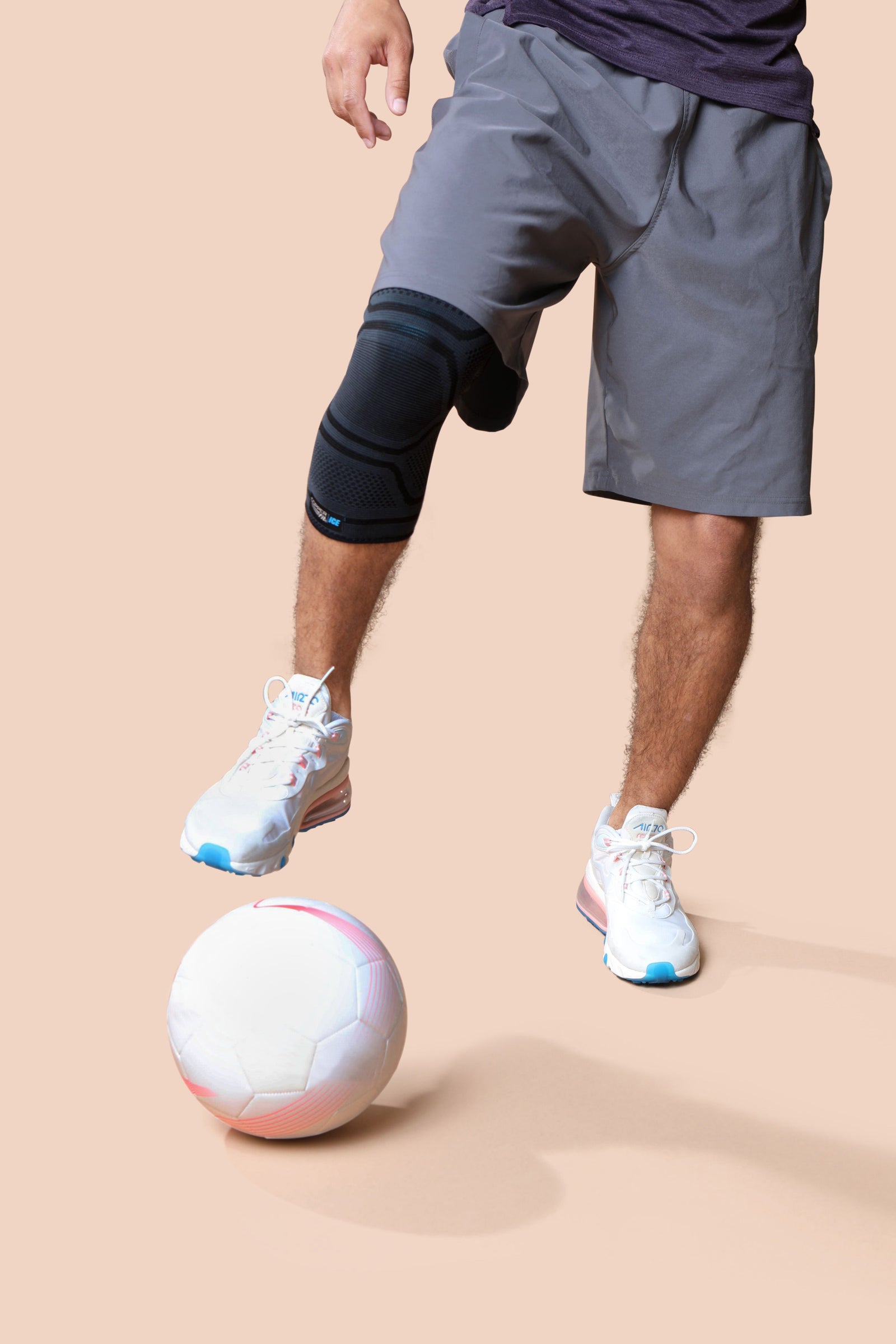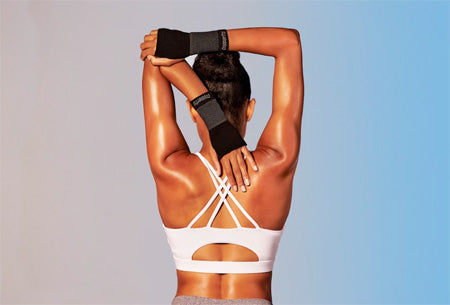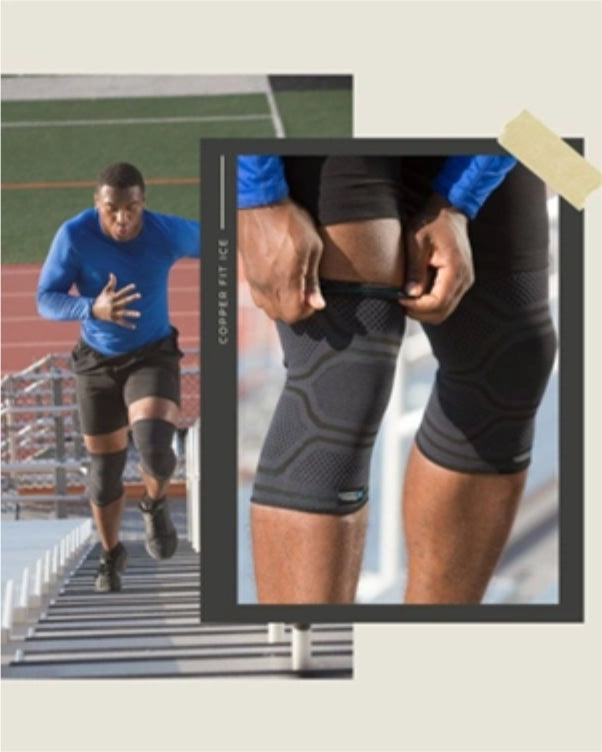
Knee health is an essential part of our overall well-being and quality of life. Our knees bear the weight of our bodies, allowing us to perform many activities, from walking and running to jumping and squatting.
However, knee problems are not uncommon and can significantly impact our mobility and fitness. This comprehensive guide will get into the importance of strengthening and supporting your knees, helping you understand how to maintain their health and function effectively.
Understanding the Anatomy of Your Knees
The knee is one of the human body's most complex and vital joints. It is a hinge joint located between the thigh bone (femur) and the shinbones (tibia and fibula). The kneecap (patella), a small bone that sits in front of the joint, provides additional protection and improves the leverage of the knee muscles.
These bones are interconnected by a network of ligaments, tendons, and muscles, which offer stability and facilitate movement. The four main ligaments in the knee include the anterior cruciate ligament (ACL), posterior cruciate ligament (PCL), medial collateral ligament (MCL), and lateral collateral ligament (LCL), which control stability and motion.
The menisci, two rubbery discs located between the femur and tibia, act as shock absorbers and provide cushioning during movement, thereby protecting the joint from stress and strain.
What Muscles Support the Knee?
The muscles surrounding the knee, including the quadriceps at the front of the thigh and the hamstrings at the back, play a critical role in movement. They contract and relax to facilitate the bending and straightening of the knee while also providing stability and control during these movements.
Understanding the intricate anatomy of your knee is the first step toward maintaining its health and strength. It allows you to appreciate the complexity of this joint and its role in your mobility. This knowledge can also help you identify the root causes of any discomfort or weakness, enabling you to make informed decisions about your knee health and take appropriate measures to maintain its strength and function.
Why Is Knee Strength Important?
Knee strength is an integral part of our overall health and fitness. Strong knees not only support our body weight but also provide for smooth, pain-free movement. They enable us to perform various activities, from walking and running to jumping and squatting, with ease and efficiency.
Moreover, knee strength plays a crucial role in preventing injuries. Strong muscles can better support the knee joint, reducing the risk of strains, sprains, and other common knee injuries.
They can also improve balance and stability, further reducing the likelihood of falls and accidents. This is particularly important for athletes and older adults, who are often at a higher risk of knee injuries.
Faster Rehabilitation
In the context of recovery, having strong knees can aid in faster rehabilitation from injuries. Strong muscles can better support a healing knee, reducing recovery time and improving the effectiveness of physical therapy. This can make a significant difference in the recovery process, helping you return to your regular activities sooner.
In essence, knee strength is not just about enhancing physical performance or athletic prowess. It's about improving the quality of life, preventing injury, and promoting health and longevity.
It also allows you to lead an active, independent lifestyle, regardless of your age or fitness level. Hence, focusing on knee strength should be a crucial part of your overall health and fitness regimen.
What Factors Can Weaken Your Knees?
Several factors can contribute to knee weakness, impacting its function and health. Understanding these factors can help you take proactive steps to maintain your knee strength.
- Aging: As we age, the natural wear and tear on our joints can lead to decreased knee strength. The cartilage in the knee can wear down, and muscle mass can decrease, both of which can contribute to knee weakness.
- Injury: Traumatic injuries, such as sprains, strains, or fractures, can cause immediate knee weakness. Over time, if not properly rehabilitated, these injuries can lead to long-term weakness and instability.
- Lack of Exercise: Regular physical activity is crucial for maintaining muscle strength. Without consistent exercise, the muscles around the knee can weaken, leading to instability and an increased risk of injury.
- Obesity: Carrying excess weight puts additional strain on the knees, which can lead to weakness over time. The increased load can accelerate wear and tear, contributing to conditions like osteoarthritis.
- Poor Posture: Poor body alignment, often due to weak core muscles or improper footwear, can place undue stress on the knees, leading to weakness and discomfort.
By being aware of these factors, you can take steps to mitigate their impact and maintain your knee strength and health.
How Can You Strengthen Your Knees?
Strengthening your knees involves targeted exercises that work the muscles surrounding the knee. Here are some exercises that can help improve your knee strength:
- Leg Lifts: Lying flat on your back, slowly raise one leg at a time while keeping the other leg bent. This exercise strengthens the quadriceps without putting pressure on the knee.
- Wall Squats: Stand with your back against a wall, slowly lower yourself into a squat position, making sure your knees don't go past your toes. Wall squats can strengthen your quadriceps and hamstrings.
- Step-Ups: Using a step or bench, step up and down while keeping your knee directly over your ankle. This exercise can help strengthen your quadriceps and improve balance.
- Hamstring Curls: While standing, slowly bend and lift your heel towards your buttocks. You can use a chair or wall for balance. Hamstring curls can strengthen the muscles at the back of your thigh.
- Low-Impact Cardio Activities: Exercises like swimming and cycling can strengthen your knee muscles while being gentle on your joints.
Technique and consistency are key in these exercises. It's also important to always warm up before exercising and cool down afterward to prevent injury. If you're new to exercise or have existing knee issues, it's a good idea to consult a healthcare professional or a physical trainer to make sure these exercises are suitable for you.
What Other Lifestyle Changes Can Improve Knee Health?
Beyond exercise and supportive gear, several lifestyle changes can significantly improve your knee health.
- Maintain a Healthy Weight: Carrying extra weight puts additional strain on your knees. Maintaining a healthy weight can reduce this strain and prevent knee problems.
- Stay Active: Regular physical activity helps keep your knee joints flexible and your supporting muscles strong.
- Eat a Balanced Diet: A diet rich in calcium and vitamin D can help maintain strong bones and prevent joint and bone diseases.
- Proper Footwear: Wearing shoes that support your arches and align your body can prevent knee pain.
- Avoid High-Impact Activities: High-impact sports or activities can put a lot of stress on your knees. Opt for low-impact activities like swimming or cycling that strengthen your knees without causing harm.
- Take Breaks: If you're sitting for long periods, take breaks to stand and walk around to prevent stiffness in your knees.
By incorporating these lifestyle changes, you can significantly improve the health and strength of your knees, enhancing your overall quality of life. Don’t forget, every small change contributes to a larger impact on your knee health.
How Can Copper Fit Products Support Your Knees?
Copper Fit offers a range of products designed to support your knees on your path to improved strength and health. Our knee sleeves and wraps are crafted to provide the necessary support while ensuring comfort and ease of movement.
Designed to help maintain the health and function of your knees, Copper Fit products offer support, allowing your muscles to work effectively during exercise, and can provide comfort during recovery periods.
Our knee sleeves are made with high-quality, durable materials that can withstand regular use. Plus, the incorporation of copper in our products helps reduce odor, ensuring you can wear them comfortably throughout your workout or during your day-to-day activities.
When Should You Seek Professional Help for Knee Problems?
If you experience persistent knee pain, significant swelling, or reduced mobility, it's best to seek professional help. These symptoms could indicate a more serious issue that needs medical attention.
Don't ignore persistent discomfort; a healthcare professional can provide a comprehensive evaluation and guide you toward an appropriate treatment plan.
Support From Copper Fit
Maintaining the strength and health of your knees is crucial for your overall well-being and quality of life. Through regular exercise, supportive Copper Fit products, and beneficial lifestyle changes, you can take proactive steps toward healthier knees.
Keep in mind that every action counts, and it's never too late to start. However, always listen to your body and seek professional help when needed.
At Copper Fit, our mission is to support your comfort and recovery, empowering you to stay active and feel your best every day. Take care of your knees, and they will carry you strong and steady through life.
Sources:
ACL injury - Symptoms and causes | Mayo Clinic
Overweight and Obesity - Causes and Risk Factors | NHLBI, NIH





